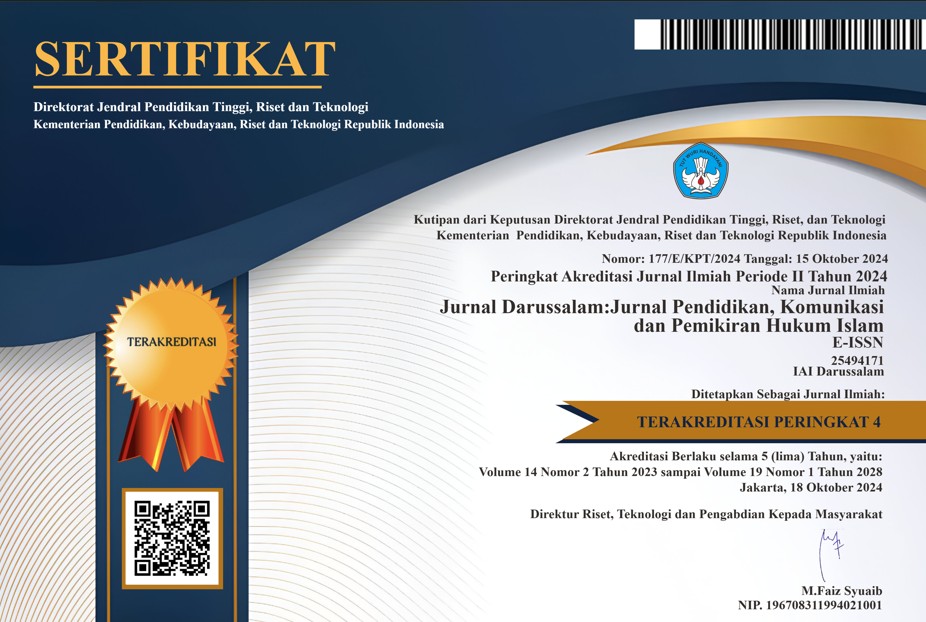Hukum Jual Beli Sepeda Motor Hasil Penarikan Debt Colector Leasing Dari Konsumen Yang Gagal Bayar Perspektif Yusuf Qhardawi Studi Kasus Desa Tanjung Gunung Kecamatan Buntu Pane
DOI:
https://doi.org/10.30739/darussalam.v15i2.2960Keywords:
Prohibited trede, Leasing collector, Islamic lawAbstract
This research discusses the legal status of buying and selling motorbikes resulting from the withdrawal of leasing collectors from consumers who failed to pay from the perspective of Yusuf al-Qardawi, a case study of Tanjung Gunung Village, Buntu Pane District, even though it is equally known that the basis of buying and selling is as an effort by the human being to maintain and meet their living needs. Furthermore, Islam does not limit a person's desire to seek wealth, as long as it is carried out according to the general principles that apply, namely halal and good by means of mutual cooperation and helping each other. Based on these problems, further research was carried out regarding the practice and law of buying and selling motorbikes resulting from leasing collectors from consumers who failed to pay, Yusuf Qardawi. The writing of this thesis uses qualitative methods, namely in the form of field research. This research is also descriptive analytical in nature, namely the author systematically describes the object being researched and then analyzed. So we can conclude the law based on the perspective of Yusuf Qardhawi's opinion that buying and selling motorbikes resulting from the withdrawal of the leasing collector from consumers who fail to pay is prohibited (haram). The main trading point of buying and selling motorbikes resulting from the withdrawal of the leasing collector will result in mutual assistance between the seller and the buyer in terms of elements of disobedience and injustice, namely committing fraud.
Downloads
References
Apipudin. (2016). Konsep Jual Beli Dalam Islam. Jurnal Islaminomic, 5(2).
Abdullah, D. S., Sohari Sahrani, Drs., Ru’fah, Hj. Dra. (2011). Fikih Muamalah. Gahalia Indonesia. Bogor.
Agama RI, Dapartemen. (2010). Al-Quran dan Tajwid. Jakarta: Sygma Press.
Diantha, I. M. P. (2017). Metodologi Penelitian Hukum Normatif dalam Justifikasi Teori Hukum. Jakarta: Kencana Prenada Media Group.
ad-Dimyati, M. S. (t.th.). I’anah at-talibin, juz III. Semarang: Usaha Keluarga.
Ghazaly, A. R., et al. (2010). Fiqh Muamalat. Jakarta: Kencana Prenada Media Group.
Haroen, N. (2007). Fiqih muamalah. Jakarta: Gaya Media Pratama.
Indonesia, Departemen Agama Republik. (1985). Al-Qur’an dan Terjemahnya. Semarang: Toha Putra.
Ibrahim, A. L. (2019). Fikih Harta. Jakarta: PT Serambi Semesta Distribusi.
Kosasih, A., et al. (2019). Pelaksanaan Perjanjian Pembiayaan Konsumen Dalam Jual Beli Kendaraan Bermotor. Jurnal Darma Agung, 27(1), 797–806. doi: http://jurnal.darmaagung.ac.id/index.php/jurnaluda/article/view/134
Koentjaraningrat. (1991). Metode-metode Penelitian Masyarakat. Jakarta: Gramedia.
Qardhawi, Y. (1986). al-Halal wa al-Haram fi al-Islam. Beirut: Dar Al Ma’rifah.
Al-Qaradhawi, Y. (1996). Fatawa Qaradhawi. (H. A. A. Bauzir, Terj.). Surabaya: Risalah Gusti.
Sucipto. (2014). Halal Dan Haram Menurut Al-Ghazali Dalam Kitab Mau’idhatul Mukminin. Istilah: Jurnal Hukum, Ekonomi dan Kemasyarakatan, 1(2).
Suhendi, H. (2000). Fiqih Muamalah. Jakarta: Grafindo Persada.
Soekamto, S. (1986). Pengantar Penelitian Hukum. Jakarta: UI Press.
Syamsul, A. (1998). Metode Penelitian. Jakarta: Pustaka Belajar.
Yusuf, A. M. (2016). Metode Penelitian Kuantitatif, Kualitatif, Dan Penulisan Gabungan Edisi Pertama. Jakarta: Prenadamedia Group.
Downloads
Published
Issue
Section
Citation Check
License
Copyright (c) 2024 Jurnal Darussalam: Jurnal Pendidikan, Komunikasi dan Pemikiran Hukum Islam

This work is licensed under a Creative Commons Attribution-ShareAlike 4.0 International License.
Semua artikel yang dipublikasikan dapat diakses secara umum melalui online dan bersifat bebas download
http://creativecommons.org/licenses/by-sa/4.0/
















